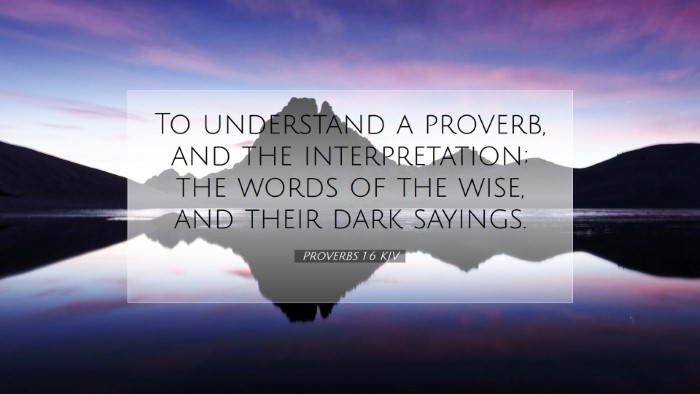Commentary on Proverbs 1:6
Verse: Proverbs 1:6 - "To understand a proverb and a figure, the words of the wise and their riddles."
Introduction
The book of Proverbs, attributed primarily to Solomon, offers wisdom and practical guidance for living a righteous life. Proverbs 1:6 serves as a crucial pivot in the introduction of this book, emphasizing the importance of understanding the words of the wise and the deeper meanings embedded in their sayings. This commentary synthesizes insights from eminent public domain commentaries, including those by Matthew Henry, Albert Barnes, and Adam Clarke.
Exposition of the Verse
Proverbs 1:6 presents a clear intention behind the sayings that follow; it calls readers to not just hear, but to actively seek understanding. This verse can be broken down into key components that merit discussion:
- Understanding Proverbial Wisdom: The term "proverb" here denotes a short, pithy saying that conveys a general truth. Matthew Henry notes that these proverbs are divinely inspired sentences designed to guide human understanding.
- Figures of Speech: The reference to "a figure" suggests that the wisdom of these sayings often lies hidden beneath metaphorical language. Albert Barnes emphasizes the necessity of discerning the symbolic meanings which require contemplation and reflection.
- Words of the Wise: The "wise" refers to those who have accumulated knowledge through experience and relationship with God. Adam Clarke affirms that the proverbs include observations not only of human behavior but of divine truths meant for our instruction.
- Riddles: The use of "riddles" indicates that the wisdom found in Proverbs is multifaceted and sometimes shrouded in complexity. It challenges readers to grapple with deeper truths. Henry explains that these riddles are designed to stimulate the mind and provoke thought, ensuring that understanding goes beyond the superficial surface.
The Purpose of Wisdom
Understanding the purpose of these proverbs is crucial. The aim is to instill both knowledge and discretion. Proverbs 1:6 frames wisdom as an enterprise, where one must engage actively. It is not merely about receiving knowledge but cultivating the ability to apply that knowledge appropriately.
Learning Contextually
Each proverb is rooted in historical and cultural context, and the reference to understanding indicates that interpretation requires a grasp of these contexts. Barnes points out that embracing wisdom involves a commitment to lifetime learning and continual application.
Spiritual Growth
As pastors and theologians delve into this verse, it invites a deep reflection on spiritual growth. Adam Clarke remarks that understanding these proverbs is akin to spiritual maturation, where one transitions from mere knowledge (the words) to wisdom (application of the words). The scholar’s task is to search for the divine wisdom that informs ethical living and decision-making.
Applications for Life
Practical applications of Proverbs 1:6 lend themselves to various aspects of life and ministry:
- Personal Reflection: Individuals are urged to pursue understanding actively, moving beyond a passive reception of truths.
- Teaching and Preaching: Pastors must strive to make their sermons accessible, engaging the congregants in understanding the deeper meanings of scripture.
- Discipleship: This verse underscores the importance of mentorship in faith. Wise individuals are called to guide others in their understanding of God's word.
- Community Building: As congregations seek to grow in wisdom collectively, discussions surrounding the practical implications of proverbs can enhance fellowship.
Conclusion
Proverbs 1:6 encapsulates the essence of the pursuit of wisdom—a call to engage deeply with the words of the wise and their figurative language. As believers and scholars endeavor to grasp these principles, they find themselves on a transformative journey toward godly living. Integrating insights from Henry, Barnes, and Clarke elucidates how this verse serves as a foundation for understanding all subsequent proverbs, aligning the reader’s heart and mind toward achieving godly wisdom.


